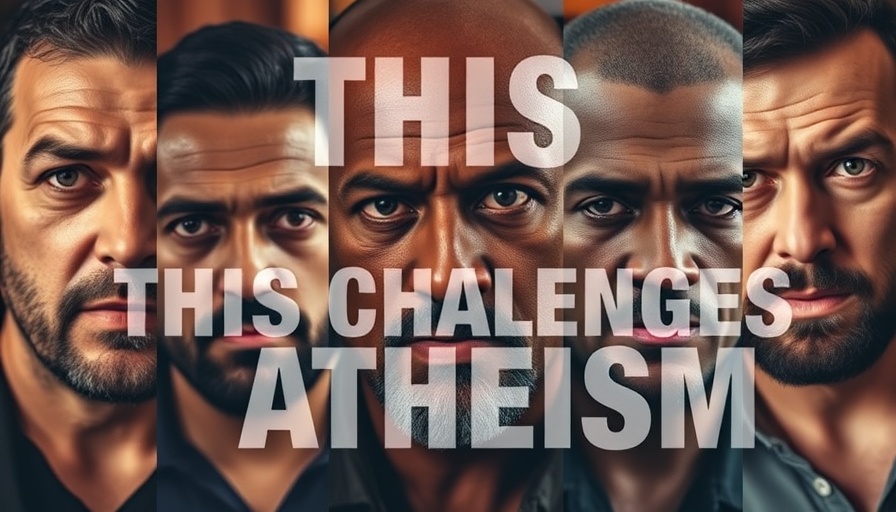
Unveiling the Creed of the Modern West
In recent discussions around our cultural identity, Protestant Paganism emerges as a poignant descriptor of the moral landscape shaped heavily by centuries of Christianity. The creed, often seen on yard signs and social media narratives, affirms values like "Black Lives Matter" and "Women's Rights are Human Rights," reflecting a moral certitude characteristic of our time. Yet, where does this fervent expression originate, and how does it align with or diverge from traditional Christian values?
In The Creed of the West: Protestant Paganism, the discussion dives into modern moral values influenced by historical Christian teachings, prompting us to analyze their implications in our current cultural milieu.
The Influence of Christianity on Modern Ideals
As explored in the video The Creed of the West: Protestant Paganism, our current cultural ethos runs parallel to core Christian teachings. Phrases like “kindness is everything” and “love is love” mimic the language of faith, rendering moral judgments that echo biblical tenets yet are often void of their foundational context. This 'Christian-ish' rhetoric has become so ingrained that individuals often dismiss its theological roots. Indeed, as the speakers noted, modern moral certainties appear derived from a post-Christian understanding, emerging from a tradition whose traces remain in daily discourse.
A Shift from Individual Faith to Collective Certainty
Historically, Christianity emphasized individual belief and moral action as personal expressions of faith. Today, however, there is a noticeable transition towards a collective resolve that insists upon adherence to contemporary ethical norms. This shift brings to light a new form of absolutism: the idea that not conforming to a socially agreed-upon standard—a sort of moral heresy—invites condemnation. This transformation raises significant questions about the very foundations of morality and ethics.
How Ancient Values Inform Modern Morals
Reflecting on the ancient philosophical ideals of Stoicism and Aristotle, which emphasized virtues like wisdom, justice, and courage, we recognize a stark contrast between these values and contemporary moral expectations. Stoics viewed virtue as being essential for personal conduct, bound to one's duty and social role. In contrast, contemporary ideals, often encapsulated in calls for compassion and equality, reflect an evolutionary shift in thought spurred by Christian theology, transforming ancient ethics into modern expectations. The messages have evolved, but the echoes of their origins persist, shaped significantly by the legacy of a Judeo-Christian ethos.
The Role of Love in Moral Frameworks
Delving deeper, the significance of love—central in Christian teachings—has continued its prominence in modern discourse. Despite its commercialization and sometimes superficial application in popular culture, the sentiment remains a key moral guiding principle in communities today. The transformation of love from a religious principle into a cultural expectation highlights both the strength of its influence and the risk of its dilution. Are we recognizing the profound implications of love as taught in the Bible, or are we merely applying it selectively to suit our social narratives?
Protestant Paganism: A Cultural Identity
Drawing from Glenn Scriber’s and Andrew Wilson's dialogue, the suggestion of a Protestant Paganism embodies a culture where deeply held beliefs coexist with a standard of ethics largely constructed without a firm theological foundation. This blending of paganism and Christian-derived convictions complicates moral reasoning and authority. Individuals increasingly navigate a landscape where the truths of Christianity inform modern ethical stances, yet those very truths are often unrecognized in debates surrounding morality.
The Nature of Your Beliefs: Questions Worth Asking
As we assess our moral imperatives, it is crucial to reflect on the underlying truths we endorse and advocate. In a world characterized by shifts from truth to personal experience, identifying the pillars upon which our beliefs stand becomes essential. Do we advocate for equality and compassion merely as social constructs, or do we uphold them as divine mandates? The answers to these questions delineate the practice of our faith in secular contexts.
Understanding Post-Christian Challenges
Today's discourse around ethics rises from a deep-rooted acknowledgment of previous Christian influences, masked beneath layers of modern ideologies. Believers, seekers, and skeptics alike face the challenge of navigating this intricate web. Addressing these complexities and fostering open dialogue around the implications of morality—a duty, a privilege, or an inclination—will prove invaluable as we endeavor to walk the tightrope of belief and practice.
Call to Action: Examining Our Cultural Engagement
As we reflect on the ideas of The Creed of the West: Protestant Paganism, let's engage critically with contemporary moral discussions. Encourage conversations with those who hold different views within our communities, understanding their positions while sharing the Christian foundation of our values. Together, we can cultivate a deeper appreciation for the origins of our moral compass while reinforcing the truth of the Gospel.
 Add Row
Add Row  Add
Add 








Write A Comment